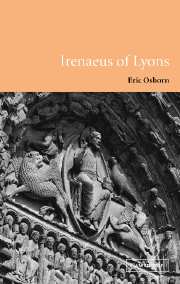Book contents
- Frontmatter
- Contents
- Preface
- List of abbreviations
- Chapter 1 Irenaeus: argument and imagery
- Part I DIVINE INTELLECT
- Part II ECONOMY
- Part III RECAPITULATION
- Part IV PARTICIPATION
- Chapter 7 Logic and the rule of truth: participation in truth
- Chapter 8 Scripture as mind and will of God: participation in truth
- Chapter 9 Aesthetics: participation in beauty
- Chapter 10 Human growth from creation to resurrection: participation in life
- Chapter 11 Goodness and truth: ethics of participation
- Part V CONCLUSION
- Appendix: Gnosticism
- Select bibliography
- Citations from Irenaeus
- Citations from the bible
- Index of classical authors
- Index of patristic authors
- General index
Chapter 7 - Logic and the rule of truth: participation in truth
Published online by Cambridge University Press: 22 September 2009
- Frontmatter
- Contents
- Preface
- List of abbreviations
- Chapter 1 Irenaeus: argument and imagery
- Part I DIVINE INTELLECT
- Part II ECONOMY
- Part III RECAPITULATION
- Part IV PARTICIPATION
- Chapter 7 Logic and the rule of truth: participation in truth
- Chapter 8 Scripture as mind and will of God: participation in truth
- Chapter 9 Aesthetics: participation in beauty
- Chapter 10 Human growth from creation to resurrection: participation in life
- Chapter 11 Goodness and truth: ethics of participation
- Part V CONCLUSION
- Appendix: Gnosticism
- Select bibliography
- Citations from Irenaeus
- Citations from the bible
- Index of classical authors
- Index of patristic authors
- General index
Summary
Participation is the fourth of Irenaeus' key concepts. Because it is the human response to the divine Intellect, economy and recapitulation, it takes many forms. However complex the first three concepts are, they are unitive and point to one God, one saving economy, one Christ. Participation is distributive, God's sharing out of his truth, beauty, life and goodness to humans in many ways. We begin with participation in truth as it comes through the rule of truth and logic.
The canon and criterion of truth was central to Hellenistic philosophy. Christians designated the central elements of their faith, gospel or kerygma with the same term. The rule had been handed down from God through the apostles. Human conversion marked a turning to divine truth from inadequate or false conceptions. Heresy issued a challenge for it claimed a source which was above argument; yet heretics showed all the weaknesses of sophists. Against them Irenaeus used the weapons of parody and pastiche, not for personal ridicule but to show that their opinions were inappropriate. His final test of truth was consonantia, a harmony which was both logical and aesthetic.
CANON AND CRITERION
The authority of the rule or canon in Irenaeus reflects a philosophical use. Kanon and kriterion dominated Hellenistic philosophy, as the tests for Stoics and Epicureans of objective truth. Epicurus devoted a work to the theory of criteria, and in a fragment On Nature insisted that no valid inquiry is possible without a canon which tests opinions.
- Type
- Chapter
- Information
- Irenaeus of Lyons , pp. 143 - 161Publisher: Cambridge University PressPrint publication year: 2001



